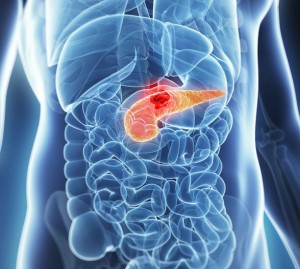By Sayer Ji
Contributing Writer for Wake Up World
Considering that the conventional treatment of advanced stage pancreatic cancer can result in as little as a 1% 5-year survival rate, new preclinical research on a liposomal turmeric extract that inhibits pancreatic tumor growth by 42% is all the more amazing.
A promising new study published in the journal Anticancer Research, a peer-reviewed medical journal published by the International Institute of Anticancer Research, reveals a unique turmeric extract known as liposomal curcumin may provide an ideal chemotherapy alternative in the treatment of highly lethal pancreatic cancers.[1]
Curcumin is the primarly polyphenol in turmeric, and has been the subject of extensive research demonstrating its ability to kill cancer cells, with over 1,500 studies available to view on Greenmedinfo.com relevant to over 100 distinct cancer types, including 24 studies demonstrating its anti-pancreatic cancer properties. [View all the curcumin studies.]
Liposomal curcumin utilizes a successful lipid-based drug delivery system, with some liposomal formulations having already received FDA approval. Owing to curcumin’s low water solubility and subsequent low systemic bioavailability, its encapsulation into liposomes (artificially-prepared vesicle composed of a lipid bilayer) greatly improves its ability to gain entry into the body by passing through the ‘glucoronidation barrier’ in the liver.
Exocrine pancreatic cancer is notorious for responding poorly to conventional treatment, with American Cancer Society statistics promising only a 14% 5-year survival rate in Stage IA cancers, spiraling down to only 1% for Stage IV types.[2] Moreover, even when chemotherapy, surgery and radiotherapy results in the successful debulking of the tumor, and the patient manages to survive past 5 years, recurrence is still common; this often occurs as a direct result of conventional treatment, which damages the immune system and enriches the treatment-resistance tumorigenic cancer stem cell population within the post-treatment cancer survivor’s body.
The new study was performed by researchers at the Department of Molecular Biology and Immunology, and Institute for Cancer Research, University of North Texas Health Science Center, Fort Worth, Texas. They determined the antitumor effects of a liposomal curcumin formulation against human pancreatic cancer cells through in vitro and xenograft studies, where the cells were implanted into mice to form tumors
The liposomal curcumin formulation was found to inhibit pancreatic cancer cell proliferation in vitro, and when administered to the animals intraperitoneally at a dose of 20 mg/kg, three-times a week for four weeks, a 42% suppression of tumor growth was observed compared to untreated controls. This would be the equivalent of 1,360 mg for a 150 lb adult. Note, the 20 mg/kg dose given to the test animals is 100 times lower than the LD50 for mice (i.e. the dose that would take to kill 50% of a test group).
Additionally, researchers observed “A potent antiangiogenic effect,” characterized by a reduced number blood vessels and other pro-angiogenic factors associated with the growth of the tumor’s blood supply.
The researchers concluded;
These data clearly establish the efficacy of liposomal curcumin in reducing human pancreatic cancer growth in the examined model. The therapeutic curcumin-based effects, with no limiting side-effects, suggest that liposomal curcumin may be beneficial in patients with pancreatic cancer.
Considering the relatively high safety margin, affordability, accessibility and effectiveness (as demonstrated by pre-clinical research and a vast body of anecdotes) of turmeric extracts in fighting highly lethal cancers, we can only hope the medical establishment begins to incorporate these medicinal spices into their treatment protocols. Considering how potent are the chemosensitizing effects of curcumin, it could be argued that it is unethical for them not to provide their patients the option of using these agents, or at the very least as adjuvants in integrative cancer care. For more information on this latter application, read our article: Integrative Cancer Research: Surviving Chemo & Radiation
For more information on why chemotherapy and radiation not only so often fail, but actually make cancer more malignant, read Chemo and Radiation Actually Make Cancer More Malignant
Article Sources
[1] Amalendu P Ranjan, Anindita Mukerjee, Lawrence Helson, Rohan Gupta, Jamboor K Vishwanatha. Efficacy of liposomal curcumin in a human pancreatic tumor xenograft model: inhibition of tumor growth and angiogenesis. Anticancer Res. 2013 Sep ;33(9):3603-9. PMID: 24023285
[2] Cancer.gov, American Cancer Society, Pancreatic Survival by Stage
Further articles by Sayer Ji
- The Cancer-Causing Metal Millions Eat, Wear or Have Injected Into Their Kids
- Turmeric Superior to Chemical Mouthwash In Improving Oral Health
- Biophotons: The Human Body Emits, Communicates with, and is Made from Light
- 10 Natural Substances That Could Help Cure Type-1 Diabetes
- 3 Evidence-Based Ways To Reverse Skin Aging Naturally
- Glyphosate (Roundup) Carcinogenic In the PARTS PER TRILLION Range
- How to Clean Your Arteries With One Simple Fruit
- 13 Evidence-Based Medicinal Properties of Coconut Oil
About the author:
 Sayer Ji is the founder and director of www.GreenMedInfo.com and an advisory board member at the National Health Federation, an international nonprofit, consumer-education, health-freedom organization.
Sayer Ji is the founder and director of www.GreenMedInfo.com and an advisory board member at the National Health Federation, an international nonprofit, consumer-education, health-freedom organization.
He co-authored the book Cancer Killers: The Cause Is The Cure, and is currently co-authoring another book with Tania Melkonian entitled EATomology: An Edible Philosophy of Food.
Check out Sayer Ji’s new collaborative project EATomology.

If you've ever found value in our articles, we'd greatly appreciate your support by purchasing Mindful Meditation Techniques for Kids - A Practical Guide for Adults to Empower Kids with the Gift of Inner Peace and Resilience for Life.
In the spirit of mindfulness, we encourage you to choose the paperback version. Delve into its pages away from screen glare and notifications, allowing yourself to fully immerse in the transformative practices within. The physical book enriches the learning process and serves as a tangible commitment to mindfulness, easily shared among family and friends.
Over the past few years, Wake Up World has faced significant online censorship, impacting our financial ability to stay online. Instead of soliciting donations, we're exploring win-win solutions with our readers to remain financially viable. Moving into book publishing, we hope to secure ongoing funds to continue our mission. With over 8,500 articles published in the past 13 years, we are committed to keeping our content free and accessible to everyone, without resorting to a paywall.







